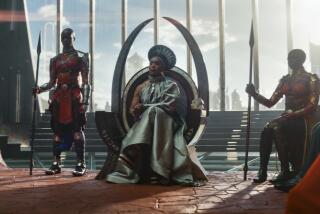China’s Dalian Wanda Group buys Legendary Entertainment for up to $3.5 billion
BEIJING — Chinese conglomerate Dalian Wanda Group has acquired Legendary Entertainment, the Hollywood production company behind “The Dark Knight,” “Jurassic World” and “Godzilla” movies.
At a signing ceremony in Beijing on Tuesday morning, Wanda Chairman Wang Jianlin announced that his company had signed an agreement to buy the Burbank production company for as much as $3.5 billion in cash.
The deal represents the largest acquisition to date of a U.S. production company by a Chinese firm and the latest sign of the deepening ties between Hollywood and the world’s most populous country.
“We already have a big impact in China, however this is not enough — we have to have a global vision,” Wang, China’s richest man, said at a news conference, an elaborate affair featuring flashing lights and long rows of models in sequin dresses.
“We have to have a position in the global industry,” Wang said. “And a few American movie companies have these commanding heights of the movie industry in the world. We want to change this situation and the landscape.”
Wanda, which began as a commercial real estate firm, has grown into a massive
diversified conglomerate in recent years, with holdings including luxury hotels, entertainment companies and e-commerce firms.
The company’s subsidiary Wanda Cinema Line is China’s biggest cinema chain, with a 14.5% share in the country’s burgeoning box office.
Wang, a former military officer, has made other forays into global markets and into the U.S. entertainment industry. In 2012, he acquired AMC Theatres, North America’s second-largest cinema chain, for $2.6 billion. A year later, Wanda donated $20 million to the Academy of Motion Picture Arts and Sciences for its film museum on the Los Angeles County Museum of Art campus.
Buying Legendary fits Wanda’s goal of creating a global media company and becoming a major player in film production. Wanda is building what it touts as “the world’s largest film and television studio” in the eastern Chinese city of Qingdao.
Spread across more than 400 acres, Wanda Studios Qingdao will house 30 soundstages, a permanent facsimile of a New York City street, a temperature-controlled underwater stage, the country’s largest exterior water tank and postproduction facilities.
The first phase of the studio is scheduled to open in 2017, and the company is seeking to lure both Chinese and international productions to the facility.
On Tuesday, Wang said that the acquisition will help Legendary Entertainment navigate access to the Chinese market, which is protected by a government-imposed limit on the number of foreign films released in the country each year. He brushed off questions about government censorship and allegations that that U.S. film companies have bowed to censors’ demands to gain a piece of the Chinese market.
Wang said many Hollywood studios already incorporate Chinese elements — actors, settings, plot devices — into their films.
“I think this is very normal because U.S. companies want to grab a share in the Chinese high-growth market,” he said. “They should do something to cater to Chinese audiences’ interests — if they don’t, there might be trouble.”
Wang said he was considering an initial public stock offering for a new entity that would combine Legendary with Wanda’s film production business, but he declined to elaborate. An IPO would be difficult in the current climate, given the market volatility in China.
But China’s film market is expected to surpass the size of the North American box office by 2017. The expanding box-office revenue in China — ticket sales surged nearly 50% last year — makes China an increasingly valuable market to U.S. film companies and has prompted a flurry of deals on both sides of the Pacific.
The agreement will leave Thomas Tull, the head of Legendary Entertainment, in place. Tull said that Wanda would not exercise any control over Legendary’s creative content.
“All we know how to do is make things that we want to see — whether that’s giant robots versus giant monsters, or whatever we want it to be, and our fans in China have liked it,” Tull said. “Nothing will change on that front. That’s something that Wanda has been incredibly specific about.”
In a separate conference call, Tull declined to discuss financial details of the transaction or confirm whether he retains an equity stake in the company he founded in 2005. Tull launched his business career running a chain of laundromats and previously headed the media investment firm Convex Group.
“From starting Legendary as an idea and growing into this today is a very proud moment,” Tull said. “It’s an exciting day here in Beijing.”
Japanese telecommunications firm SoftBank Group Corp. and investment firm Waddell & Reed Inc. have also agreed to sell their stakes in the company to Wanda, a person familiar with the transaction told The Times last week.
Times staff writer Daniel Miller in Los Angeles contributed to this report.
More to Read
From the Oscars to the Emmys.
Get the Envelope newsletter for exclusive awards season coverage, behind-the-scenes stories from the Envelope podcast and columnist Glenn Whipp’s must-read analysis.
You may occasionally receive promotional content from the Los Angeles Times.










